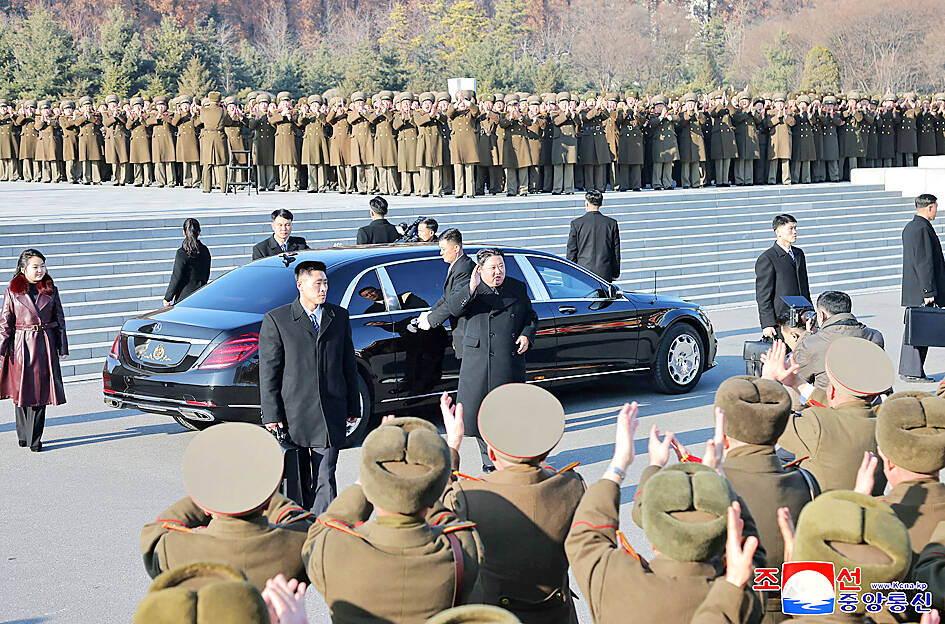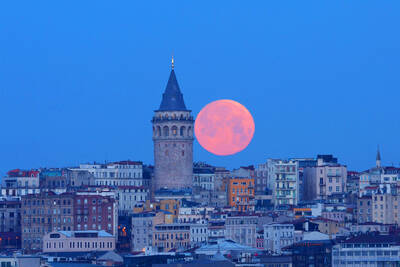UN experts say they are investigating 58 suspected North Korean cyberattacks from 2017 to last year valued at approximately US$3 billion, with the money reportedly being used to help fund its development of weapons of mass destruction.
Moreover, the high volume of cyberattacks by North Korean hacking groups who report to the Reconnaissance General Bureau, Pyongyang’s primary foreign intelligence organization, is reportedly continuing, the panel of experts said in the executive summary of a new report to the UN Security Council obtained on Friday by The Associated Press.
The report covering the period from July last year to last month and reflecting contributions from unidentified UN member nations and other sources, was sent to the 15-member council as North Korean leader Kim Jong-un has raised tensions in the region.

Photo: AFP / KCNA via KNS
He is threatening to annihilate South Korea if provoked and escalating weapons demonstrations. In response, the US, South Korea and Japan have bolstered their combined military exercises.
Amid the increased military and political tensions on the Korean Peninsula, the experts said North Korea “continued to flout [UN] sanctions,” further developed its nuclear weapons and produced nuclear fissile materials — the weapons’ key ingredients.
The experts said a light-water reactor at North Korea’s main nuclear complex at Yongbyon “appeared to be operational.”
South Korean Minister of National Defense Shin Won-sik said in late December that the reactor would likely be formally operational by the summer, amid suspicions the North might use it as a new source of fissile materials for nuclear weapons.
North Korea has long produced weapons-grade plutonium from its widely known 5-megawatt reactor at Yongbyon. The light-water reactor would be an additional source of bomb fuels, and observers say its bigger capacity could allow it to produce more plutonium.
Yongbyon also has a uranium enrichment facility.
The panel said activities at North Korea’s Punggye-ri nuclear test site “continued.”
US and South Korean officials have said North Korea is likely preparing to conduct its seventh nuclear test from the site, which would be the first since 2017.
Outside estimates on the size of North Korea’s nuclear arsenal vary, ranging from 20 to 60 to more than 100. Experts say North Korea can add six to 18 bombs each year.
Since his diplomacy with the US collapsed in 2019, Kim has repeatedly vowed to build more nuclear weapons and introduce high-tech weapons to cope with what he calls intensifying US hostility.
The panel said that during the six-month period ending last month, the Democratic People’s Republic of Korea (DPRK) — the North’s official name — launched at least seven ballistic missiles — one a three-stage intercontinental ballistic missile, one possibly an intermediate-range missile and five short-range ballistic missiles.
After two failed attempts, it successfully placed a military observation satellite in orbit, the experts said.
Moreover, a diesel submarine was retrofitted as a “tactical nuclear attack submarine” and added to the North’s military arsenal.
The panel, which monitors UN sanctions against North Korea, said the DPRK continues importing refined petroleum products in contravention of UN Security Council resolutions, using “combinations of obfuscation methods” to evade maritime sanctions.
The DPRK’s recorded trade volume last year surpassed the total for 2022, the experts said, including a large variety of consumer goods, “some of which could be classified as luxury items” that are banned by UN sanctions.
The panel said it is also investigating reports from member states about the DPRK supplying arms and ammunition in violation of UN sanctions.
The US, Ukraine and six allies last month accused Russia of using North Korean ballistic missiles and launchers in a series of devastating aerial attacks against Ukraine.
During the six-month period, the experts said, “trends include DPRK targeting of defense companies and supply chains, and increasingly sharing infrastructure and tools.”
The panel said it also investigated reports of numerous DPRK nationals working overseas, including in information technology, restaurants and construction, and earning income in contravention of UN sanctions.
And in another sanctions violation, they said: “The DPRK continues to access the international financial system and engage in illicit financial operations.”
UN sanctions are not supposed to hurt ordinary North Koreans, but the panel said “there can be little doubt that UN sanctions and their implementation have unintentionally affected the humanitarian situation and some aspects of aid operations.”
However, “their relative role remains impossible to disaggregate from many other factors,” it said.

ANGER: A video shared online showed residents in a neighborhood confronting the national security minister, attempting to drag her toward floodwaters Argentina’s port city of Bahia Blanca has been “destroyed” after being pummeled by a year’s worth of rain in a matter of hours, killing 13 and driving hundreds from their homes, authorities said on Saturday. Two young girls — reportedly aged four and one — were missing after possibly being swept away by floodwaters in the wake of Friday’s storm. The deluge left hospital rooms underwater, turned neighborhoods into islands and cut electricity to swaths of the city. Argentine Minister of National Security Patricia Bullrich said Bahia Blanca was “destroyed.” The death toll rose to 13 on Saturday, up from 10 on Friday, authorities

RARE EVENT: While some cultures have a negative view of eclipses, others see them as a chance to show how people can work together, a scientist said Stargazers across a swathe of the world marveled at a dramatic red “Blood Moon” during a rare total lunar eclipse in the early hours of yesterday morning. The celestial spectacle was visible in the Americas and Pacific and Atlantic oceans, as well as in the westernmost parts of Europe and Africa. The phenomenon happens when the sun, Earth and moon line up, causing our planet to cast a giant shadow across its satellite. But as the Earth’s shadow crept across the moon, it did not entirely blot out its white glow — instead the moon glowed a reddish color. This is because the

DEBT BREAK: Friedrich Merz has vowed to do ‘whatever it takes’ to free up more money for defense and infrastructure at a time of growing geopolitical uncertainty Germany’s likely next leader Friedrich Merz was set yesterday to defend his unprecedented plans to massively ramp up defense and infrastructure spending in the Bundestag as lawmakers begin debating the proposals. Merz unveiled the plans last week, vowing his center-right Christian Democratic Union (CDU)/Christian Social Union (CSU) bloc and the center-left Social Democratic Party (SPD) — in talks to form a coalition after last month’s elections — would quickly push them through before the end of the current legislature. Fraying Europe-US ties under US President Donald Trump have fueled calls for Germany, long dependent on the US security umbrella, to quickly

Local officials from Russia’s ruling party have caused controversy by presenting mothers of soldiers killed in Ukraine with gifts of meat grinders, an appliance widely used to describe Russia’s brutal tactics on the front line. The United Russia party in the northern Murmansk region posted photographs on social media showing officials smiling as they visited bereaved mothers with gifts of flowers and boxed meat grinders for International Women’s Day on Saturday, which is widely celebrated in Russia. The post included a message thanking the “dear moms” for their “strength of spirit and the love you put into bringing up your sons.” It